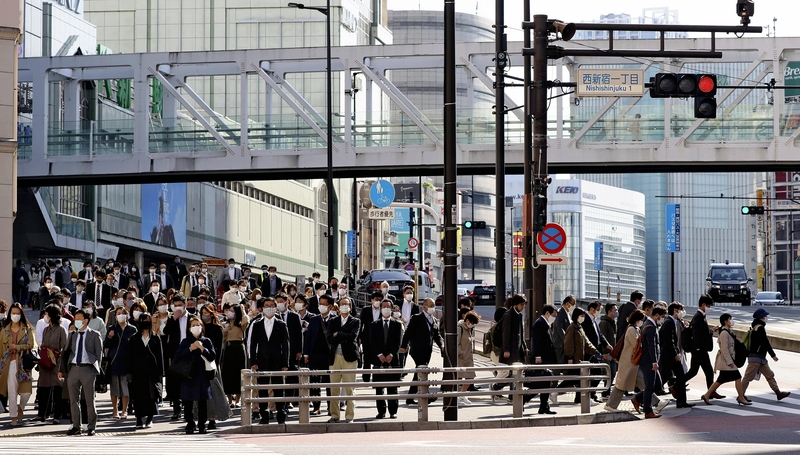
Another state of emergency has been declared for Tokyo and the three prefectures of Osaka Kyoto and Hyogo, and the government on Monday asked the business community to reduce the number of employees working in offices by 70%. However, during the prior two state of emergency declarations, companies could reduce the number of employees in the office by a maximum of only 30%. With no end of the pandemic in sight, telecommuting as a leading infection prevention measure seems to have reached its limit.
"We want to reduce commuter traffic by 70%. If this fails to contain the pandemic, we will have to take tougher measures," Yasutoshi Nishimura, the minister in charge of economic revitalization and measures against the novel coronavirus, said during a teleconference with leaders of three major economic organizations including Keidanren, the Japan Business Federation, on Monday, which was the first weekday after the fresh declaration of a state of emergency.
Nishimura strongly called for telecommuting to be implemented.
The government set the same numerical target in its requests during the prior states of emergency in April 2020 and January.
In response, Nobuyuki Koga, chairman of Keidanren's Board of Councillors and special senior advisor to Nomura Holdings, Inc., showed a cooperative attitude, saying, "I understood very well what the minister said. We will continue to thoroughly implement telecommuting."
Sompo Japan Insurance Inc. on Friday issued guidelines promoting an 80% cut in the number of employees commuting to its headquarters in Shinjuku Ward, Tokyo, going further than the government request.
Dai-ichi Life Insurance Co. announced to headquarters employees that the 70% number is not a "target," but it must be "strictly observed."
At Hitachi Ltd., 70% of employees in Tokyo had been working from home, the figure was 50% nationwide, and the company now says employees in areas under the state of emergency should work from home in principle.
However, achieving the government's 70% request is proving difficult.
According to a poll conducted by the Japan Productivity Center, the percentage of employees working remotely stood at 31.5% in May last year during the first state of emergency. The percentage declined to 22% in January during the second state of emergency and 19.2% in April after it was lifted.
One major bank maintains a target of 60%, even after the latest state of emergency was declared. Banks are financially supporting cash-strapped companies in the face of the pandemic. "Since the Financial Services Agency asks for outlets to be open, it's difficult for branch workers to work from home," a public relations official at the bank said.
Furthermore, some sectors, such as manufacturing, transport companies and the service industry, can take only limited measures.
"At a plant, manpower is essential to operate the production line," an official at a major maker said. "Telecommuting isn't just difficult, it's impossible."
Some companies have implemented alternate measures.
Japan Post Holdings Co. is encouraging employees to take paid days off during the Golden Week holiday period to extend the vacation. Mitsubishi Corp. prohibited eating at the same table within and outside the company in principle, while Sumitomo Mitsui Banking Corp. is asking all employees to refrain from attending events such as welcome and farewell parties.
--Dissatisfaction with government
Some in the business community are complaining about the government requesting a 70% reduction every time it declares a state of emergency.
"The state of emergency declaration has a huge impact on small and midsize companies, which have exercised much patience so far," Akio Mimura, chairman of the Japan Chamber of Commerce and Industry, said Thursday. Mimura urged the government to make the current state of emergency declaration the last one.
"Japan is closer to the bottom than the top in terms of worldwide vaccination rates, which is a worrying situation," Kengo Sakurada, chairman of the Japan Association of Corporate Executives (Keizai Doyukai) said, and there is a strong call for more effective infection prevention measures.
"As seen in young people drinking on the street, people are losing trust in the government and they're not listening to it," an official related to Keizai Doyukai said. "If the situation goes on like this, it will be impossible to stop people from traveling even though a state of emergency is declared."
Read more from The Japan News at https://japannews.yomiuri.co.jp/







